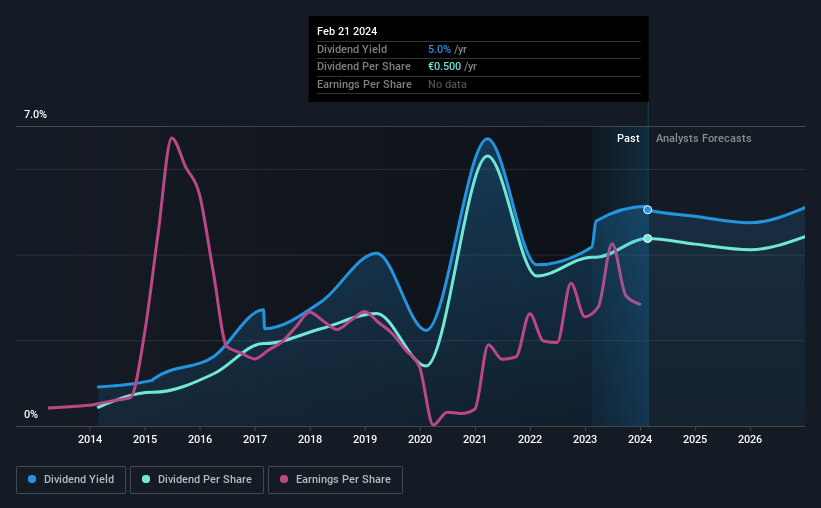- Finland
- /
- Capital Markets
- /
- HLSE:TAALA
Taaleri Oyj (HEL:TAALA) Is Paying Out A Larger Dividend Than Last Year

Taaleri Oyj (HEL:TAALA) has announced that it will be increasing its dividend from last year's comparable payment on the 19th of April to €1.00. This takes the annual payment to 5.0% of the current stock price, which unfortunately is below what the industry is paying.
Check out our latest analysis for Taaleri Oyj
Taaleri Oyj Doesn't Earn Enough To Cover Its Payments
While yield is important, another factor to consider about a company's dividend is whether the current payout levels are feasible. The last payment was quite easily covered by earnings, but it made up 255% of cash flows. While the company may be more focused on returning cash to shareholders than growing the business at this time, we think that a cash payout ratio this high might expose the dividend to being cut if the business ran into some challenges.
EPS is set to fall by 27.8% over the next 12 months. Assuming the dividend continues along recent trends, we believe the payout ratio could reach over 200%, which could put the dividend under pressure if earnings don't start to improve.

Dividend Volatility
While the company has been paying a dividend for a long time, it has cut the dividend at least once in the last 10 years. The dividend has gone from an annual total of €0.05 in 2014 to the most recent total annual payment of €0.50. This works out to be a compound annual growth rate (CAGR) of approximately 26% a year over that time. Despite the rapid growth in the dividend over the past number of years, we have seen the payments go down the past as well, so that makes us cautious.
Dividend Growth May Be Hard To Achieve
With a relatively unstable dividend, it's even more important to evaluate if earnings per share is growing, which could point to a growing dividend in the future. However, Taaleri Oyj's EPS was effectively flat over the past five years, which could stop the company from paying more every year. Growth of 1.3% per annum is not particularly high, which might explain why the company is paying out a higher proportion of earnings. While this isn't necessarily a negative, it definitely signals that dividend growth could be constrained in the future unless earnings start to pick up again.
In Summary
Overall, we always like to see the dividend being raised, but we don't think Taaleri Oyj will make a great income stock. With cash flows lacking, it is difficult to see how the company can sustain a dividend payment. We don't think Taaleri Oyj is a great stock to add to your portfolio if income is your focus.
Investors generally tend to favour companies with a consistent, stable dividend policy as opposed to those operating an irregular one. At the same time, there are other factors our readers should be conscious of before pouring capital into a stock. To that end, Taaleri Oyj has 2 warning signs (and 1 which doesn't sit too well with us) we think you should know about. If you are a dividend investor, you might also want to look at our curated list of high yield dividend stocks.
Valuation is complex, but we're here to simplify it.
Discover if Taaleri Oyj might be undervalued or overvalued with our detailed analysis, featuring fair value estimates, potential risks, dividends, insider trades, and its financial condition.
Access Free AnalysisHave feedback on this article? Concerned about the content? Get in touch with us directly. Alternatively, email editorial-team (at) simplywallst.com.
This article by Simply Wall St is general in nature. We provide commentary based on historical data and analyst forecasts only using an unbiased methodology and our articles are not intended to be financial advice. It does not constitute a recommendation to buy or sell any stock, and does not take account of your objectives, or your financial situation. We aim to bring you long-term focused analysis driven by fundamental data. Note that our analysis may not factor in the latest price-sensitive company announcements or qualitative material. Simply Wall St has no position in any stocks mentioned.
About HLSE:TAALA
Flawless balance sheet, undervalued and pays a dividend.
Market Insights
Community Narratives




